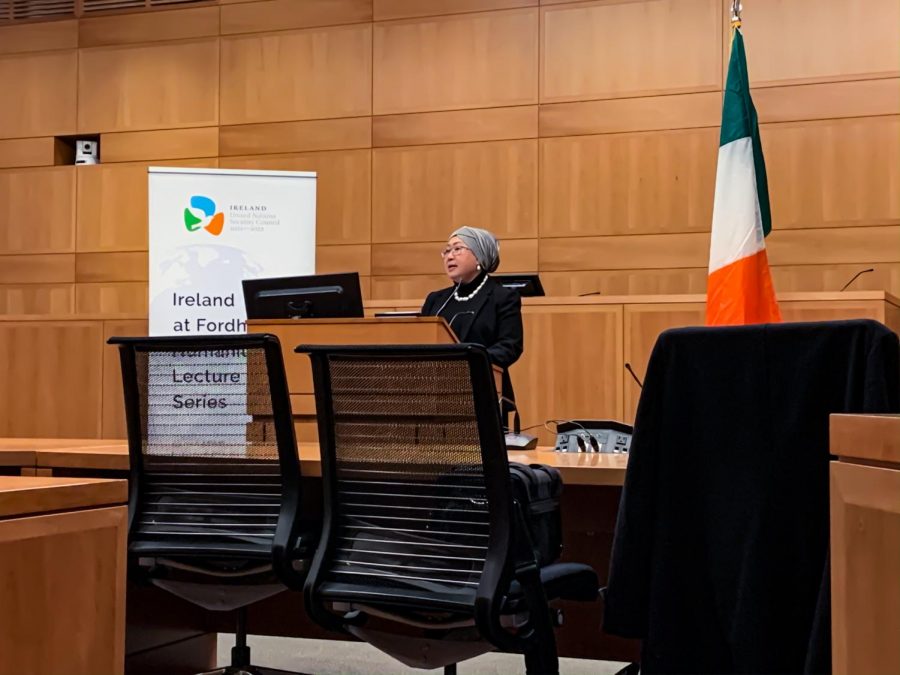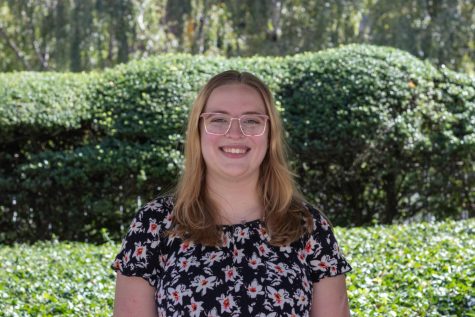Speaker Emphasizes The Need for Trust in Humanitarian Aid
Jermilah Mahmood spoke about the biggest challenges facing humanitarian workers in the 21st Century.
February 11, 2020
In the third lecture for Fordham’s Humanitarian Lecture series, Jermilah Mahmood, Ph.D., spoke to Fordham undergraduate and law students and faculty about the need to restore trust in humanitarianism in her lecture “The Trust Deficit in Humanitarian Action: Does Going Local Address It?”
The lecture took place on Feb. 7, following the speeches by Mary Robinson and the President of Ireland Michael Higgins. The lectures are meant to instill the Jesuit values of education and the need to promote justice into Fordham students. The lectures also teach Fordham students about the challenges that humanitarian workers face in the 21st century. To Mahmood, the biggest challenge facing humanitarian workers today is the lack of trust.
“Trust is a matter of life and death,” Mahmood said. “If the right people don’t trust us, as humanitarians, we can very literally die. And so can they.”
Mahmood served as the Chief of the World Humanitarian Summit secretariat at the United Nations in New York before joining the International Federation of Red Cross and Red Crescent Societies. She also founded the Medical Relief Society (MERCY) Malaysia, which she led from 1999-2009.
As she continued her speech, Mahmood told many stories of those in need not trusting humanitarian aid projects/workers/services. During the Ebola outbreak, Mahmood said the people in need had heard many rumors regarding the aid workers, and believed that the burial teams were replacing bodies with rocks and selling the organs and that the people at the Ebola centers were injected with poison and died.
Mahmood used this story to highlight to the audience that by listening, trust can be reestablished. The team working on the Ebola outbreak changed to clear body bags and allowed people to see their family members in order to work against the rumors.
“Yes, we listened,” Mahmood said regarding the Ebola case. “But more importantly, we acted.”
Mahmood made it clear to her audience that the biggest problem is that humanitarian aid workers often do not listen to the actual needs of the people they are helping. According to Mahmood, over 70% of those receiving aid trusted humanitarian aid while 75% said that their actual needs were not being met. According to UNICEF, the aid given to the crisis in the Central African Republic did meet some health goals but only 33% of those affected felt as though the aid helped their communities livelihood and resilience.
“How can we expect the people we serve to trust us if we are not willing to trust them?” Mahmood asked her audience.
She furthered her point by stating that it is not that humanitarian workers do not talk to those they are helping, rather that they don’t actually listen. Even when the listening occurs, often there is no action to make a change.
“Our humility, our deep knowledge of culture, our innate ability to easily build relationships with diverse communities, our natural ability to listen, understand and learn from the people we support were crucial building blocks to enable us to deliver the best possible assistance for people,” Mahmood said about her own experience in listening.
The end of her speech focused on empowering young students to try and change the way that humanitarian aid works. She asked the audience for their tweets and posts to help keep the organizations responsible and to encourage them to keep working for change, tying back to the beginning of her speech.
“No one is walking out of here free,” Mahmood said.
Mahmood forced every person in the audience to look at the world around them and consider how they can make a positive change to the world, an important thing for soon-to-be college graduates to think about.













